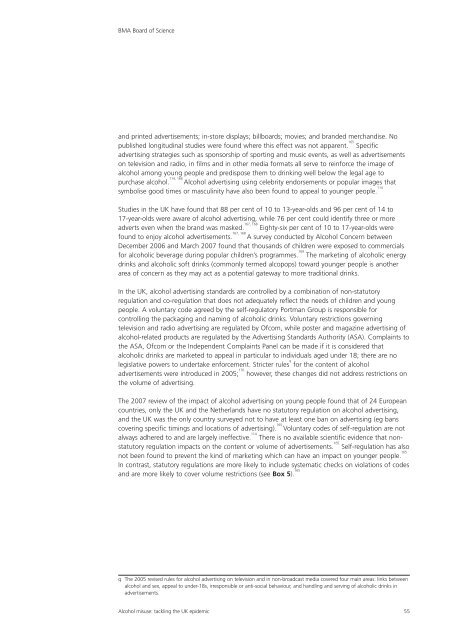Alcohol misuse: tackling the UK epidemic - London
Alcohol misuse: tackling the UK epidemic - London
Alcohol misuse: tackling the UK epidemic - London
You also want an ePaper? Increase the reach of your titles
YUMPU automatically turns print PDFs into web optimized ePapers that Google loves.
BMA Board of Science<br />
and printed advertisements; in-store displays; billboards; movies; and branded merchandise. No<br />
published longitudinal studies were found where this effect was not apparent. 165<br />
Specific<br />
advertising strategies such as sponsorship of sporting and music events, as well as advertisements<br />
on television and radio, in films and in o<strong>the</strong>r media formats all serve to reinforce <strong>the</strong> image of<br />
alcohol among young people and predispose <strong>the</strong>m to drinking well below <strong>the</strong> legal age to<br />
114, 166<br />
purchase alcohol. <strong>Alcohol</strong> advertising using celebrity endorsements or popular images that<br />
symbolise good times or masculinity have also been found to appeal to younger people. 114<br />
Studies in <strong>the</strong> <strong>UK</strong> have found that 88 per cent of 10 to 13-year-olds and 96 per cent of 14 to<br />
17-year-olds were aware of alcohol advertising, while 76 per cent could identify three or more<br />
167, 168<br />
adverts even when <strong>the</strong> brand was masked. Eighty-six per cent of 10 to 17-year-olds were<br />
167, 168<br />
found to enjoy alcohol advertisements. A survey conducted by <strong>Alcohol</strong> Concern between<br />
December 2006 and March 2007 found that thousands of children were exposed to commercials<br />
for alcoholic beverage during popular children’s programmes. 169<br />
The marketing of alcoholic energy<br />
drinks and alcoholic soft drinks (commonly termed alcopops) toward younger people is ano<strong>the</strong>r<br />
area of concern as <strong>the</strong>y may act as a potential gateway to more traditional drinks.<br />
In <strong>the</strong> <strong>UK</strong>, alcohol advertising standards are controlled by a combination of non-statutory<br />
regulation and co-regulation that does not adequately reflect <strong>the</strong> needs of children and young<br />
people. A voluntary code agreed by <strong>the</strong> self-regulatory Portman Group is responsible for<br />
controlling <strong>the</strong> packaging and naming of alcoholic drinks. Voluntary restrictions governing<br />
television and radio advertising are regulated by Ofcom, while poster and magazine advertising of<br />
alcohol-related products are regulated by <strong>the</strong> Advertising Standards Authority (ASA). Complaints to<br />
<strong>the</strong> ASA, Ofcom or <strong>the</strong> Independent Complaints Panel can be made if it is considered that<br />
alcoholic drinks are marketed to appeal in particular to individuals aged under 18; <strong>the</strong>re are no<br />
legislative powers to undertake enforcement. Stricter rules q<br />
for <strong>the</strong> content of alcohol<br />
advertisements were introduced in 2005; 170<br />
however, <strong>the</strong>se changes did not address restrictions on<br />
<strong>the</strong> volume of advertising.<br />
The 2007 review of <strong>the</strong> impact of alcohol advertising on young people found that of 24 European<br />
countries, only <strong>the</strong> <strong>UK</strong> and <strong>the</strong> Ne<strong>the</strong>rlands have no statutory regulation on alcohol advertising,<br />
and <strong>the</strong> <strong>UK</strong> was <strong>the</strong> only country surveyed not to have at least one ban on advertising (eg bans<br />
covering specific timings and locations of advertising). 165<br />
Voluntary codes of self-regulation are not<br />
always adhered to and are largely ineffective. 114<br />
There is no available scientific evidence that nonstatutory<br />
regulation impacts on <strong>the</strong> content or volume of advertisements. 165<br />
Self-regulation has also<br />
not been found to prevent <strong>the</strong> kind of marketing which can have an impact on younger people. 165<br />
In contrast, statutory regulations are more likely to include systematic checks on violations of codes<br />
and are more likely to cover volume restrictions (see Box 5). 165<br />
q The 2005 revised rules for alcohol advertising on television and in non-broadcast media covered four main areas: links between<br />
alcohol and sex, appeal to under-18s, irresponsible or anti-social behaviour, and handling and serving of alcoholic drinks in<br />
advertisements.<br />
<strong>Alcohol</strong> <strong>misuse</strong>: <strong>tackling</strong> <strong>the</strong> <strong>UK</strong> <strong>epidemic</strong> 55
















